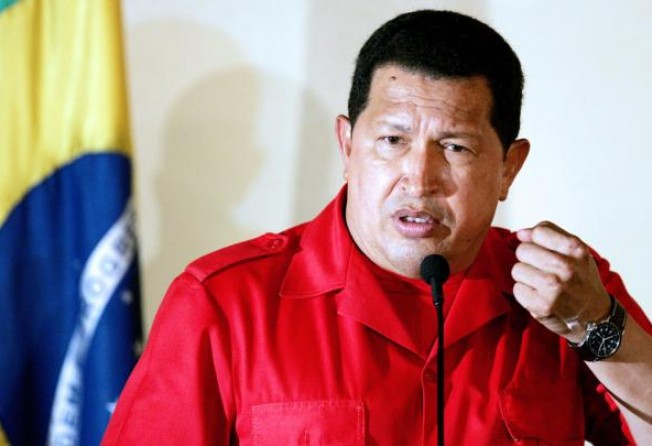Hugo Chavez reign highlights the pitfalls of populism
Hu Shuli looks at how, by focusing on short-term benefits for the people, a charismatic leader can undermine longer-term development and stability

The death of Venezuelan strongman Hugo Chavez last week after 14 years in power marks the end of an era. He leaves behind a legacy that politicians and members of the public, including those in China, would do well to reflect on.
Many of president Chavez's acts and speeches proved controversial and the reaction to his demise has been mixed, both at home and abroad.
But there is no doubting his influence in Latin American left-wing populism. He was also one of a few 21st-century state leaders who retained a "cold war" mentality and was keen on social experiments.
Chavez enjoyed wide public support during his time in power, losing only one of the four elections and five referendums held in Venezuela in the past 12 years. His political slogan, "Socialism of the 21st century", combined a variety of thoughts. As a spokesman for the grass roots, he divided society into two classes: the poor and the oligarchs, and focused on the interests of the people.
Chavez appeared to be a leftist, but was in fact a populist. Buoyed by the nation's plentiful oil reserves, he launched a number of social programmes, providing the lower-middle class with health-care benefits as well as education and employment.
In the international arena, he described himself as an "anti-American fighter" and gave impressive speeches through the mass media and other channels. In short, he had all the qualities of a populist leader.
The early 21st century saw a shift to the left in Latin American politics, known as the "Pink Tide". The movement supports anti-globalisation, liberalisation of the economy and a better livelihood for the people, but is different from the "red socialism" practised in Cuba.
In recent years, the democratic political systems in many Latin American countries have become more stable. Countries such as Brazil, Mexico, Chile and Uruguay no longer favour economic policies hostile to foreign investors, or massive nationalisation. They encourage privatisation and a market economy, while focusing on people's livelihood. Yet, Venezuela has followed its own populist path.
Chinese scholar Yu Keping said: "Populism is an extremely complicated phenomenon. It has a connotation of democracy, but can ultimately lead to autocratic rule. It includes patriotism, but can often lead to extreme nationalism. It is against elite politics, but often leads to highly centralised individual power. It appears to be a radical force, but in fact is a backward, conservative one." This description accurately describes the situation in Venezuela under Chavez.
Chavez considered himself a revolutionary. He was against powerful foreign forces, and protected civilians while targeting the rich. He did not believe in free trade, and was reluctant to develop a market economy. His "oil socialism" and attempts to nationalise on a huge scale meant that although the country could raise sufficient capital in the short term, in the longer term it faces problems associated with inadequate investments and declining production, while its GDP growth is tied into fluctuating oil prices. In addition, a monopoly leads to corruption, reducing efficiency. Over the past 10 years, Venezuela has chosen to ignore the chances to create wealth and a healthy market, with obvious consequences.
Although Chavez was democratically elected, opponents regarded him as a dictator. He revised the constitution to give himself expanded powers and had three governing tools - an obedient parliament, state-owned oil resources and a loyal army.
Although a basic form of democracy still existed, with opposition parties, full elections, a media that could criticise the government, and a right to demonstrate, under the autocratic structure, the judiciary became weak and the central bank lost independence.
Chavez' constitutional amendments also eliminated restrictions on re-election of the president. Media control was enforced and a lack of checks and balances in the system led the country towards populist authoritarianism.
Similarly, the Bo Xilai scandal in Chongqing is an example of populism that could undermine a country's long-term development. Democracy, the rule of law and a market economy create long-term stability. Just like Bo's campaign to crack down on crime, "oil socialism" cannot, in the long run, bring stability.
Income inequality, corruption and rigid social strata are the source of populist movements. When politicians condemn injustice by highlighting class struggles, they can easily win the support of disadvantaged groups.
Charismatic leaders such as Chavez are good at painting a rosy picture of the future. Pleased with the short-term benefits that populism brings, the people cannot see its longer-term problems. When they wake up, it is too late.
History shows that a backward economy and culture, and a weak rule of law pave the way for the rule of man and populism. The consequences of this have been particularly evident in Chongqing. Those in power take advantage of the hatred of the rich and create another kind of "class struggle". And the irony is that behind the manipulators of public opinion are powerful officials and their families amassing huge wealth.
The death of Chavez has ended the strongman story of a big oil country. Venezuela is gradually returning to a normal society. On the other side of the globe, the "Chongqing incident" took place a year ago. With this startling reality, Chinese will be pondering what Chavez left behind with a special interest for a long time to come.
This article is provided by Caixin Media. www.caixin.com